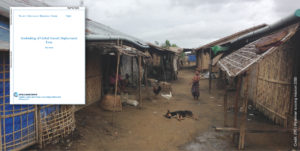Data collection and data quality present significant challenges for evidence-based responses to displacement. This is echoed in the recent World Bank report, Stocktaking of Global Forced Displacement Data (Feb 2017), which outlines the need for more and better data on forced displacement, and specifically acknowledges profiling as a method for overcoming this gap.

The report reviews available data on forcibly displaced persons, including the group for which the evidence is least robust, IDPs. Data from UNHCR and IDMC form the backbone of the global analysis on IDP data and various challenges are outlined providing a good overview of the subject.
The World Bank attributes the inconsistency of displacement data to a variety of reasons, including a lack of consensus on definitions; limited official standards and guidance on how to collect data on IDPs; the difficulty of collecting primary data in conflict-affected areas; the difficulty to obtain figures on displacement flows and protracted situations; the potential for manipulation of data for political purposes; and the generally ad hoc nature of data collection and reporting practices.
The report highlights moreover that development actors especially lack the information needed for longer-term planning and interventions. This includes data on the socio-economic vulnerabilities and needs of both displaced and host communities, as well as returnees. Furthermore, it calls for assessments of interventions to address the development impacts of forced displacement.
The following recommendations are given to improve forced displacement data under the following areas:
In contrast to the existing gaps, the World Bank highlights the work of JIPS in supporting governments and operational organisations to design and implement data collection processes. The report underlines the value that profiling exercises bring to mitigating the dearth of data on IDPs, especially in developing countries, and welcomes the launch of the DART that increases accessibility to the data produced.
The report also welcomes the work being undertaken through the Expert Group on Refugee and IDP Statistics (EGRIS), endorsed by the UN Statistical Commission (UNSC) and led by UNHCR, Statistics Norway and Eurostat, as part of which JIPS is currently leading a group of experts to develop a Technical Report on IDP Statistics and make recommendations for consideration at the UNSC in 2018.